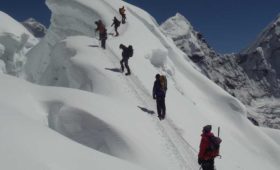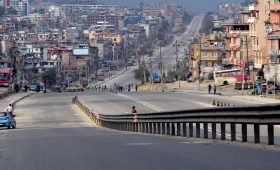Trekking in Nepal on your own and without any support staff to carry your backpack is a big challenge. In general terms, the support staff is known as porter. They are also regarded as mountain transports. They are strong and familiar with the hill walks. Some people like to accept this challenge though. The high altitude adventure treks are very much demanding. If you have a support staff, it gives you a comfort. Hiring support staff gives you extra safety and provides an opportunity to interact with the local culture. You are also supporting the local economy by employing a person. Your porter could be a medium of you and the people of the area.
However, the porters are not always treated well. They also need safety from their employers. There are not many things to do in order to keep them safe. If you use registered Trekking Company, they have provision of insurance and there are also porters’ clothing bank in Kathmandu and Lukla established by the joint effort of KEEP (Kathmandu Environmental Education Project) and TAAN (Trekking Agencies Association of Nepal). So, what makes your porter safe? Please make sure that they have proper trekking equipment to wear and are enough.
We advise you to remain cautious on porters’ safety codes:-
1. Ensure if they are Insured:
Most Trekking Companies have ‘Bulk or Group Insurance Policy’ for their porters and guides. So, make sure of it by checking with them before booking the trek.
2. Make sure if they are fairly paid:
It is important to know if your support staff gets fair wages. There are labor laws that have protected daily wages rate for different trekking areas such as Everest, Annapurna, Langtang, Kanchenjunga, Mustang, Manaslu, Dolpa etc. Their wages also vary for teahouse and camping treks.
3. Use of Responsible Trekking Agency:
There are only a few Trekking Companies that strictly follow responsible travel codes. The responsible travel codes include providing jobs to the local people, caring of support staff, respecting fair wages policy, helping to conserve nature etc.
4. Check Food, Shelter and their clothing:
Ensure whether your porter gets sufficient and hygienic food, if they have proper equipment such as trousers, jackets, shoes, gloves and sun glasses to keep them safe during extreme weather conditions. Porters can also borrow clothing from the Porters’ Clothing Bank. Also, we recommend you to contribute some of your equipment to the Porters’ Clothing Bank after the trek is finished.
5. Never leave sick porters abandoned:
We strongly urge you to treat them as of your own family members specially when they are sick. They also deserve the same standard of treatment, care and rescue facility. Make sure that the sick porter is sent down with someone who speaks their language.
6. Meeting before the trek:
It is a good idea to meet and have some conversation before the trek starts. It provides a chance to understand some personal interests. Note that you are going to spend a few weeks together.
7. Tip your porter:
It is a way of giving gratitude for their hard work. It can vary though. Give the tip in the form of cash directly to your porter and let them know it is because they did an incredible job.




